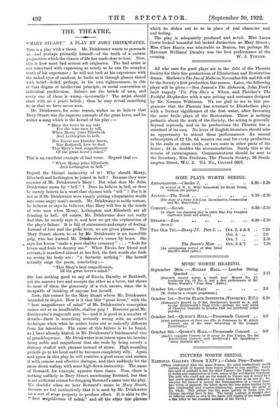THE THEATRE.
"MARY STUART." A PLAY BY JOIDI DRINZWATER.
This is a play with a thesis. Mr. Drinkwater wants to persuade us—and perhaps primarily himself—of the truth of a certain proposition which the chance of life has made dear to him. Now, this is how most bad serious art originates. The bad artist is not concerned with expressing as nearly as he can the complex truth of his experienee ; he will not look at his experience with the naked eyes of candour, he looks at it through glasses tinted with belief—belief, perhaps, in his own righteousness, in this or that dogma or intellectual principle, or social convention or individual predilection. Thflnite are the beliefs of men, and every one of them is wrong—necessarily ! The artist should start with no a priori beliefs ; then he may reveal something to us that we have never seen.
Mr. Drinkwater, for some reason, wishes us to believe that Mary Stuart was the supreme example of the great lover, and he writes a song which is the kernel of his play :—
" Mary the lover be my tale For the wise men to toil, When Moray joins Elizabeth And Lethington in hell.
Not Riccio nor Darnley knew, Nor Bothwell, how to find This Mary's best magnificence Of the great lover's mind."
This is an excellent example of bad verse. Regard that :— "When Moray joins Elizabeth And Lethington in hell."
Regard the blatant insincerity of it ! Why should Moray, Elizabeth and Lethington be joined in hell ? Because they were enemies of Mr. Drinkwater's Mary ! But what does Mr. John Drinkwater mean by " hell " ? Does he believe in hell, or does
he merely believe in a word that rhymes with " " ? For it is not as if Mr. Drinkwater were simply putting vituperative words into some angry man's mouth. Mr. Drinkwater is nobly serious, he believes or says he believes, that Mary will live in the minds of wise men when Moray, Lethington and Elizabeth are all frizzling in hell. Of course, Mr. Drinkwater does not really feel this, he merely says it, and here we get the explanation of the play's failure. It is full of statements and empty of feeling. Instead of love and the gat lover, we are given phrases. The Mary Stuart shown to us by Mr. Drinkwater is an incredible prig, who has learned Mr. Drinkwater's verses by heart. She
• says her lovers "make a poor shabby company" . . . "fools for lovers and fools to destroy me." When Riccio, her friend and servant, is murdered almost at her feet, the first words she finds on seeing his body are : "a fantastic nothing." She herself actually sings the poem, concluding :— " This Mary's best magnificence, Of the great lover's mind."
She has nothing good to say of Ricci°, Darnley or Bothwell, yet she marries two and accepts the other as a lover, but shows to none of them the generosity of a rich nature, since she is incapable of thinking of anyone but herself.
Now, this cannot be the Mary Stuart whom Mr. Drinkwater intended to depict. How is it that this "great lover," with the "beat magnificence of mind" of Mr. Drinkwater's conception comes out as an insufferable, shallow prig ? However good Mr. Drinkwater's stagecraft may be—and it is good in a number of details—there is something seriously wrong with an artist's technique when what he makes turns out so radically different from his intention. The cause of this failure is to be found, as 1 have already hinted, in Mr. Drinkwater's fundamental vice of grandiloquence. Mr. Drinkwater is so intent upon his heroine being noble and magnificent that she ends by being merely a dummy stuffed with phrases instead of straw. High-sounding periods go to his head until he becomes completely silly. Again and again in this play he will contrive a good scene and sustain it with. concise and effective dialogue, and then suddenly let the scene down wallop, with some high-flown insincerity. The name of Ronsard, for example, appears three times. Now, there is nothing unlikely in Mary Stuart mentioning Ronsard, but that is not sufficient reason for dragging Ronsard's name into the play. We shudder when we hear Ronsard's name in Mary Stuart, because we feel instinctively that it is used by Mr. Drinkwater us a sort of stage prdperty to produce effect. lb is akin to the "best YE agniacence of mind," and all the other fine phrases
which he dishes out to us in place of real character and real feeling.
The play is adequately produced and acted. Miss Laura Cowie looked beautiful but lacked distinction as Mary Stuart ; Miss Clare Harris was admirable as Beaton, but perhaps Mr. Harcourt Williams' Darnley was the best performance of the


































 Previous page
Previous page